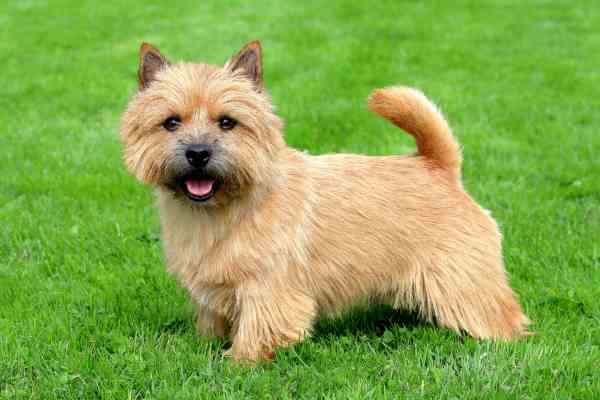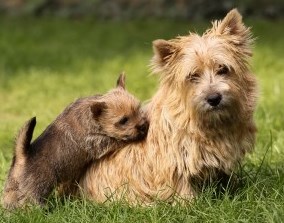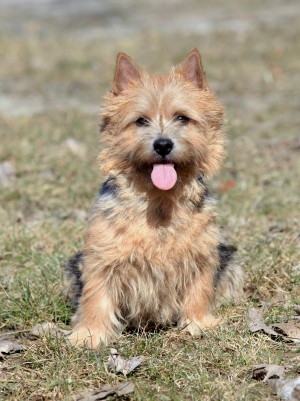The Norwich Terrier
 The Norwich Terrier
The Norwich TerrierBy Janice Jones | Updated February 16, 2019
A small, spirited, and foxy little dog, the Norwich Terrier is a cute little dog that may be perfect for you.
They are short little terriers and their cute faces somewhat resemble a fox. This breed’s cute appearance and trainability make them very popular in Hollywood and TV commercials.
Some of their famous fans include Jonathan Adler and Betty Lou Phillips.
The Norwich terrier is a very active and playful pup with very high spirits and high energy levels. They are not to be mistaken for lap dogs, or a dog that will sit down and have tea with you and your friends.
This breed likes to be running around and playing rather than having down time. If you want a dog that will cuddle with you and be calm with you and your family, then the Norwich terrier is not for you.

The Norwich terrier often is mistaken for the closely related, Norfolk terrier. The only difference between the two is that the Norwich has prick, upright ears, while the Norfolk terrier has floppy ears.
They are very stocky little dogs with short legs, and a sturdy body.
The Norwich terrier is actually one of the smallest terriers, which only adds to their cuteness.
Do not mistake them for having little personalities because of their physical size. What they lack in size, they definitely make up for in personality.
If you are in the market for an adorable dog that is loyal and fearless with high energy levels, look no further than the Norwich Terrier.
Quick Facts
Other Names Used: Norwich
Affiliation: Terrier group; AKC recognized in 1936, CKC, FCI, UKC
Size
Height: 10-12 inches; 25-27 centimeters
Weight: 12 pounds; 5.5 kilograms
Coat Type: coarse, wiry outer coat with a softer coat underneath
Colors: Red, wheaten, tan, black and tan, or grizzle
Country of Origin: East Anglia, England
Activity Level: High to very high
Life Expectancy: 12-15 years
Good with Children: Yes
Good with Other Pets: They are good with cats, dogs, and larger animals. This breed would not be good in a home that also has small rodents such as rabbits, hamsters, guinea pigs, etc. They could be mistaken for prey.
The Norwich terrier came from East Anglia, England and some people think that the breed is descended from the Irish terrier, but the exact history is unclear.
The Norwich terrier and the Norfolk terrier was once the same breed, with two different ear types, but were separated by the English in 1964.
In 1979, the AKC officially decided that the Norwich was the breed with prick ears that stood up, and the Norfolk had droopy ears.
The Norwich was originally developed as a barnyard ratter and later used to flush foxes out from underground tunnels and burrows.
They were small enough to be carried, but these feisty canine companions were placed on the ground during a hunt.
Personality of the Norwich Terrier

The Norwich Terrier is a very willful pup and they are the epitome of the saying, ‘big things come in small packages’. They definitely make up for their small size with their massive personality.
They are high spirited and charming, but they do not make good lap dogs. This breed is adaptable to apartment living, but they are full of energy and do not want to be sitting around all day.
It is also important to keep this in mind if you work a 9-5 job and cannot be home with your Norwich. They need daily, regular exercise and are extremely active dogs.
This breed is surprisingly trainable, especially for a terrier, and they can be trained to be happy, independent little dogs.
They need ground rules though. They will not train themselves and need a firm hand in training. It is crucial that they know who is in charge.
Similar to other Terriers, this breed can develop Small Dog Syndrome if they are not carefully trained and socialized as puppies.
Small Dog Syndrome is a condition in where the dog believes they are the owner and the pack leader. This can lead to anxiety, excessive barking, restlessness, etc., and can tend to be a problem.
It is also important not to leave your Norwich outside alone for extended periods. A bored Norwich is likely to pick up bad habits such as digging and barking.
However, if your pup is trained well as a puppy, socialized with strangers as well as family, and is not left alone for too long, then you will have a beautifully trained addition to your family.
This particular breed of dog gets along great with children, but no so much other pets. Dogs, cats, and larger animals are okay, but with its natural terrier instinct, it is hard to have smaller pets such as rodents.
Your dog may mistake them for prey and try to chase them and hunt them. Although this ratting instinct may make not allow you to have small pets, it is a very entertaining aspect of this breed.
They will chase anything you throw at them whether that is a ball, a stick, a toy, etc., and they will love every minute of it.
The good thing about this type of terrier is that they are not that noisy of a breed, contrary to popular terrier beliefs.
They will however warn their owners of strangers that are approaching, which is why they also make good watchdogs. However, once they realize that there is no threat, they are incredibly friendly with anyone.
Overall, the Norwich Terrier is a very outgoing dog. They are very loving, but do not expect them to be a lap dog.
Grooming
Grooming with the Norwich Terrier can be a bit tricky because of their thick double coat.
They need regular grooming and a trip or two to the groomers every year for hand stripping. Thia is where they pluck the old hair out of the coat.
This can be expensive or time consuming if you choose to do this yourself.
Other than that, regular bathing is needed as well as checking your dog’s nails, nose, ears, mouth, and so forth.
Health Concerns
This breed in generally healthy but they are prone to back problems, eye disease, and upper airway syndrome, which is a respiratory disorder.
They also have cesarean births, but other than that, they are a healthy breed. Since they are still small dogs, they are prone to some common health issues such as
- Cataracts
- Upper Airway Syndrome
- Luxating Patellas
- Hip Dysplasia
Pros
- Good with children
- Very friendly and loyal
- Easily trainable and adaptable
- Very active
- Not known to be barkers
Cons
- Not a lap dog
- Prone to small dog syndrome
- Do not do well with hamsters, bunnies, etc.
- Grooming can be expensive and time consuming
- Prone to upper airway syndrome
Did You Know...
Did you know that this breed has a few famous fans such as Jonathon Adler and Betty Lou Phillips?
For the Norwich Terrier Lover
Resources and Further Reading
Norwich Terrier Club of America
If this breed interests you, you might want to check out these books for further information. Small Dog Place always recommends that you thoroughly research a breed even before you contact a breeder or rescue organization. Be sure this breed is the Best Choice for You! These books are available at Amabzon.
Recommended for You
About Janice (author and voice behind this site)
Having lived with dogs and cats most of her life, Janice served as a veterinary technician for ten years in Maryland and twelve years as a Shih Tzu dog breeder in Ohio.
Her education includes undergraduate degrees in Psychology with a minor in biology, Early Childhood Education, and Nursing, and a master's in Mental Health Counseling.
She is a lifelong learner, a dog lover, and passionate about the welfare of animals. Her favorite breed for over 50 years has been the Shih Tzu, but she has also lived with Poodles, Maltese, Yorkshire Terriers, Beagles, English Bulldogs, Carin Terriers, and a Cocker Spaniel.
When not writing, reading, and researching dog-related topics, she likes to spend time with her eight Shih Tzu dogs, husband, and family, as well as knitting and crocheting. She is also the voice behind Miracle Shih Tzu and Smart-Knit-Crocheting
Does This Article Deserve Your Thumbs Up?
We always appreciate your support and encouragement. Your thumbs up means so much to us. Please like this article.
If you find this page or any page on Small Dog Place Helpful, or useful in anyway, I'd love it if you would click the small heart found on the bottom right of each page.
You can also share or bookmark this page -- just click on the:

Free Monthly Newsletter
Sign Up for Our Free Newsletter and get our Free Gift to You.
my E-book, The Top 10 Mistakes People Make When Choosing a Dog (and how to avoid them)




